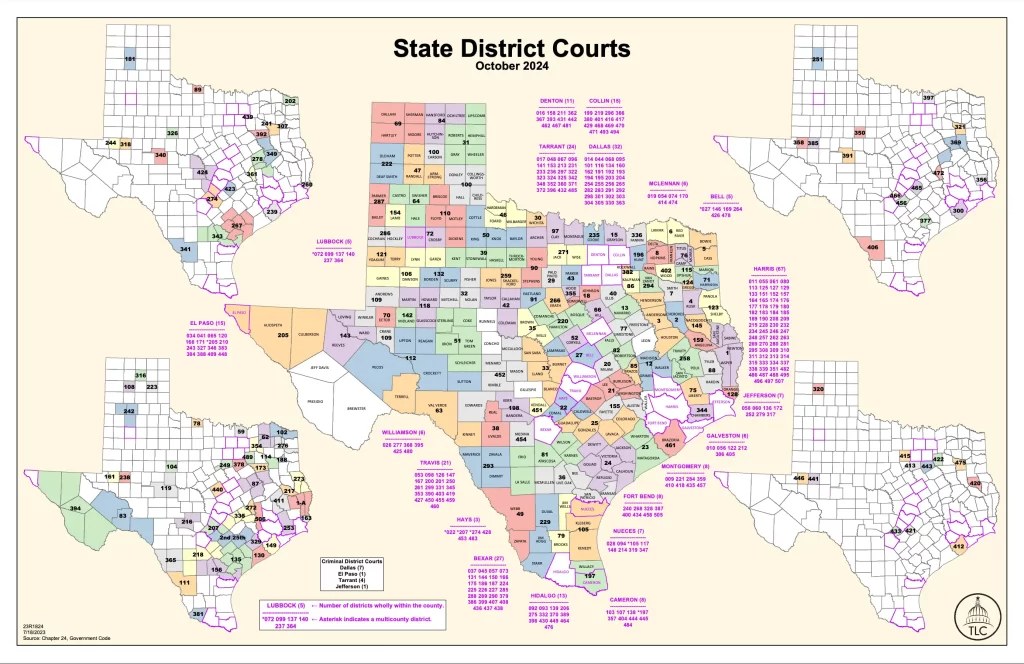District courts in Texas are trial courts where a judge or jury decides a criminal or civil matter. The district courts are part of the judiciary of Texas, responsible for administering justice throughout the state. Each district court is presided over by an elected or appointed judge, who must be a licensed and experienced lawyer. Most district court judges in Texas are elected, though some are appointed when vacancies arise between elections, in certain circumstances.
Texas’s system of district courts dates to the foundation of the Republic of Texas in 1836, though judges at that time were appointed by the Texas Congress and not elected. While other components of the judiciary were added later, such as municipal courts, the district courts form the original core of the Texas court system, tasked with handling the most series cases and trials.
Jurisdiction

Each district court serves a geographical area consisting of one or more counties. As of January 2025, Texas had 504 district courts, according to the Office of Court Administration.
District courts generally handle serious criminal cases (felonies), divorce cases, land title cases, election cases, and civil disputes involving $200 or more. However, 13 district courts handle only criminal cases and are designated “criminal district courts.”
District courts do not handle lesser crimes, known as misdemeanors, which are handled by county courts. The one exception is a misdemeanor involving official misconduct.
Role as Trial Courts
District courts are the primary trial courts in Texas, meaning they are courts in which cases are first heard, rather than appellate courts. They are also the courts where jury trials are most often held, rather than bench trials involving only a judge.
Unlike appellate courts, which only review the decisions of lower courts, district courts hear witnesses, receive testimony, review evidence, and render a verdict in a trial.
Jury vs Bench Trials
In Texas district courts, either a judge or a 12-member jury determines the facts of a case. Texans have the constitutional right to a jury trial, but they may choose to waive that right, particularly in civil cases or when both parties agree to a bench trial. In a bench trial, the judge acts as both the fact-finder and the decision-maker, determining both the facts of the case and the applicable law.
Jury trials are more common in criminal cases, where a defendant has the right to a trial by jury, but they can also be used in civil matters if requested. Bench trials, however, may be preferred in certain situations, such as when the issues are complex or the parties seek a quicker resolution. The decision in a bench trial is made solely by the judge, without input from a jury
Appellate Process
Appeals from the district courts go to the Texas Courts of Appeal, except that death penalty cases go directly to the Texas Court of Criminal Appeals.
Appellate review is generally limited to matters of law rather than questions of fact, meaning appellate courts do not retry cases or hear new evidence. If the appellate court finds that a legal error likely influenced the verdict or sentencing, it may reverse the decision or order a new trial.
Election of Judges
Voters directly elect district court judges in Texas during general elections, with each judge serving a four-year term and no limits on the number of terms they can serve.
This process differs from many other states and the federal system. In some states, judges are appointed by the governor or chosen through a merit-based selection process, whereas in Texas, the direct election method allows citizens to have a direct say in choosing their judges. Similarly, on the federal level, the U.S. president nominates judges, with the advice and consent of the Senate.
The direct election of judges in Texas emphasizes local control and accountability, though it also raises concerns about judicial impartiality and the influence of political parties and interest groups.

Qualifications of Judges
To serve as a district court judge in Texas, an individual must meet certain constitutional and legal qualifications. These requirements are designed to ensure that judges have the necessary experience and background to handle the responsibilities of the position. The qualifications are as follows:
- U.S. Citizenship: Must be a citizen of the United States.
- Texas Residency: Must have been a resident of Texas for at least two years immediately preceding the election or appointment.
- District Residency: Must have resided in the district for which they will serve for at least two years prior to the election or appointment, and be registered to vote in that district.
- Age: Must be at least 25 years old at the time of taking office and younger than 75.
- Legal Experience: Must be licensed to practice law in Texas and have at least eight years experience as a practicing lawyer or judge.
- Good Standing: Must not have been convicted of a felony or other crime that would disqualify them from serving in public office.
- Other Qualifications: Judges must also meet any additional qualifications as set by Texas law, such as not being under indictment or facing criminal charges that could impact their fitness for office.
Judges in Texas may not serve past 75 years of age. They automatically vacate their position upon turning 75. In 2023, voters in Texas rejected a proposed state constitutional amendment that would have increased the compulsory retirement age from 75 to 79.
Boundaries and Creation of New Courts
In Texas, judicial districts are created by the state legislature, which defines their boundaries and determines the number of judges. These districts are reviewed and adjusted to reflect population changes, ensuring judicial representation based on factors like population size and regional needs.
District boundaries are typically based on population and county lines. Rural districts may cover multiple counties, while urban districts are smaller due to higher population densities.
The Judicial Districts Board, established by the legislature, advises on the creation and modification of judicial districts. The redistricting of judicial districts and the creation of new courts often follow the U.S. Census every 10 years, as population shifts and increases may require adjustments.
However, the Texas Legislature may add courts or judicial districts during any legislative session, not just after the census.
Over the years, the number of district courts in Texas has grown from 64 in 1845, when the state was admitted to the Union, to over 500 in the present day.



